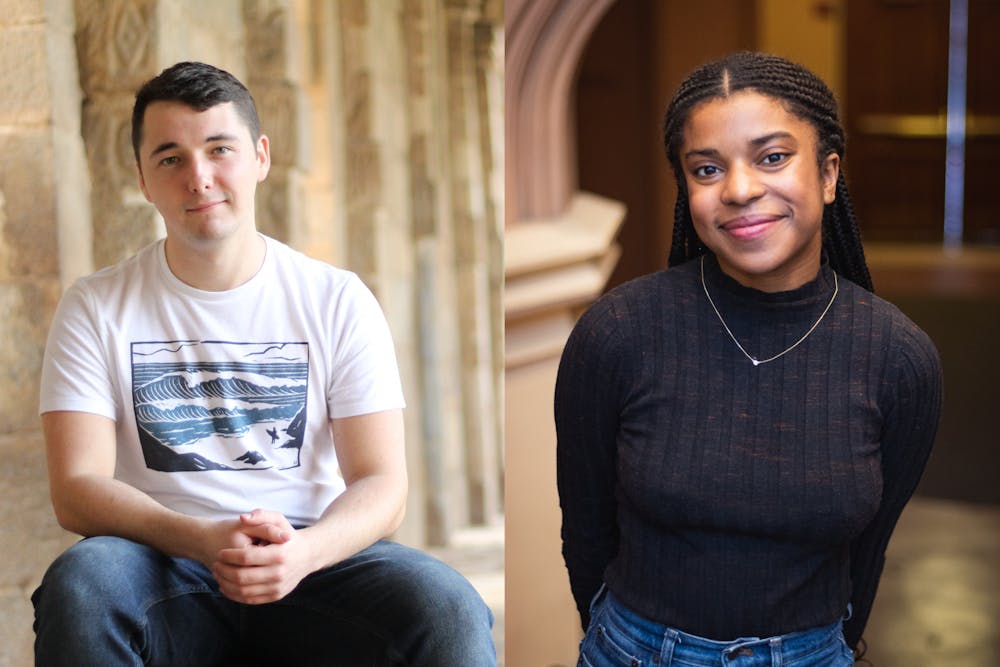Danielle Stephenson ’20 and Riley Wagner ’20 were awarded the Princeton ReachOut 56–81–06 fellowships for year-long public service projects. The two students will join a long list of alumni who have conducted public service projects immediately after graduation.
The fellowship, now in its 20th year, is the only University award completely funded by alumni volunteers. Typically the fellowship funds medical and legal projects ranging from promoting bail reform to supporting youth in the criminal justice system, but the two recipients this year work in the fields of the arts and engineering.
According to Jean Telljohann, co-chair of the fellowship selection committee, Stephenson stood out for her music involvements on campus and ability to juggle multiple part-time jobs, including her work with kindergarten students. For Wagner, the selection committee valued his work with Engineers Without Borders.
Stephenson, a French and Italian concentrator, will implement a music education curriculum with Los Angeles’s BEST Afterschool Enrichment program.
“I thought about how my Princeton professors instructed me in music, and I wondered how I could magnify that teaching and focus less on individual achievements,” Stephenson said.
Stephenson’s classical training in music fostered an appreciation for the arts, but songwriting and composition cemented her passion. Last year, she self-released a solo album, “Water Signs,” that has been streamed over 50,000 times on Spotify. At the University, she sings with the University Jazz Vocal Collective, Sensemaya Afrobeat All-Stars, and the Tigressions.
As Stephenson considered options after college, she knew she wanted to launch a project that would teach kids how to write their own music.
“I studied music classically and always sung in choirs or played the clarinet and piano. When I learned GarageBand, I realized I could be independent and make music with my friends — that’s when I realized I could be both independent and collaborative,” Stephenson said.
In her project, Stephenson will teach kids aged 5–12 GarageBand software. The LA BEST enrichment program traditionally supports kids from low-income backgrounds.
“I saw a lack of music education in Los Angeles in public school compared to wealthier students in other public schools,” Stephenson said.
Stephenson added that free access will open doors for the students, similar to how GarageBand fostered her love for music creation.

At the University, Stephenson holds a part-time job working with kindergarteners. She chose this student demographic because she believes younger children are blank slates. By the time kids reach middle school, they have developed their interests and personalities further.
“Working with kindergarten students is an equally daunting and magical opportunity,” Stephenson said.
“My study of languages allowed me to fully appreciate the beauty of cultural differences, and LA is such a multicultural city,” Stephenson said. “I want to uplift the perspectives and languages of the students, and I’m excited about this project because it’s so centered on collaborative exploration.”
Wagner, a concentrator in the Department of Chemical and Biological Engineering department, had just walked out of the shower when a phone call gave him the good news.
“While I love research, what really called me to this fellowship was action-oriented and hands-on-the-ground work. That’s typically harder to find in a research setting, and the fellowship gave me an opportunity to help me develop the goal,” Wagner said.
In Argentina, Wagner will work with Ingeniería Sin Fronteras (ISF), the Argentinian version of Engineers Without Borders, on a water distribution system in the community of San Antonio de Copo. Although Engineers Without Borders has been around the United States for decades, ISF started in 2012.
Wagner will work with the organization’s water and energy projects in a community facing water shortages. ISF works closely with the local school community, and Wagner will have high school students join in on the construction of a water project to improve their technical skills.
“With an NGO, it’s hard to see what needs to be done until we’re actually on the ground. But once we’re there, I can see what needs to be done and optimize my impact,” Wagner said.
Argentina holds a special place in Wagner’s heart. In high school, the United States Department of State offered Wagner his first scholarship to travel abroad to Argentina. His visit to the country started an international journey that diversified Wagner’s perspective beyond small town Virginia.
Next year, Wagner wants to give back to a country that has a deep personal impact. Having studied abroad in Spain, his Spanish skills will also assist him in his travels across Argentina, where he especially looks forward to exploring the country’s food.
“At Princeton, you have everything except time,” Wagner said. At an information session about the fellowship, a past recipient told Wagner the ReachOut fellowship offered the gift of time.
As he prepares to leave for Argentina, Wagner is excited to break away from the pressures of the University and explore similar projects in a foreign country. In the long term, he said he aspires to work with renewable energy, hoping to develop novel solutions to address climate change.








